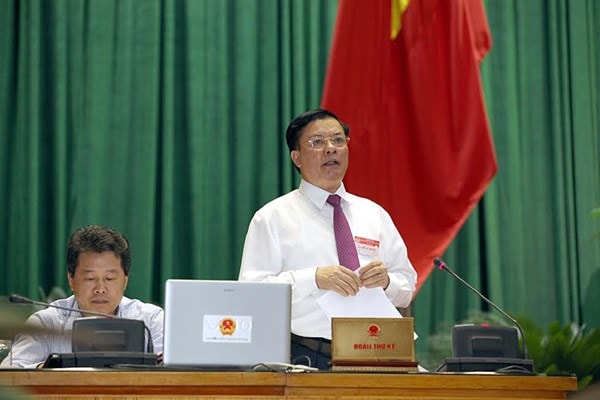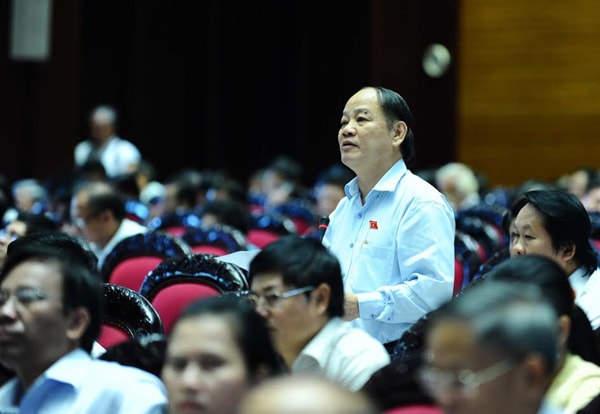Question and answer session before the National Assembly: Paying the people 4 debts
“The first is public debt, the second is the debt of education and training quality. The third debt is the debt of legal documents, the fourth is the problem of pending complaints and lawsuits, solutions to fight against loss, waste and negativity. Those are the four big debts, the "hot" issues that voters are concerned about. Therefore, the National Assembly (NA) will spend 2.5 days on questioning and answering questions to repay voters.”
That was the statement of National Assembly Chairman Nguyen Sinh Hung opening the question and answer session of the National Assembly on the afternoon of June 10. Minister of Finance Dinh Tien Dung was the first person to answer the question.
 |
| Minister of Finance Dinh Tien Dung at the question and answer session. Photo: Hoang Phong |
Increase revenue by 12-14%/year, reasonable deficit to ensure debt repayment
At the beginning of the question-and-answer session, Minister Dinh Tien Dung immediately encountered difficult questions. Deputies Le Thi Cong (Ba Ria - Vung Tau) and Huynh Nghia (Da Nang) raised a series of urgent issues: "Currently, the economy is facing many difficulties, budget revenue is low, public debt is increasing, but the Ministry of Finance still reports that public debt is safe - I request the Minister to clearly answer whether public debt is really safe or not? How can we afford to pay the debt? What solutions are there to ensure national financial security?"
Answering this question, Minister Dinh Tien Dung said that in absolute terms, public debt has tended to increase in recent years. However, compared to GDP, the rate has not changed much, respectively in 2010 it was 51.7%, 2011 it was 50.1%, 2012 it was 50.8% and the estimate for 2013 was 54.1%. "This rate is within the threshold allowed by the National Assembly of 65%" - Mr. Dung affirmed.
However, the head of the finance sector also said that according to the public debt structure, about 50% is foreign debt with basic preferential loan conditions and a remaining maturity of about 15 years. The remaining 50% is domestic loans through the issuance of government bonds with maturities mostly ranging from 2-5 years, so the pressure on new loans to repay old domestic loans is relatively large.
“This is a serious issue,” said Minister Dinh Tien Dung. “We have reported to the Prime Minister and the Government to discuss options for restructuring public debt in the direction of extending the repayment period from loans through government bonds from 5-7 years.” Mr. Dung also said that the issue in the coming period of management is to arrange the budget to repay the debt, especially from domestic resources by implementing the task of collecting the budget to meet the requirements set by the National Assembly and the Government in the financial sector development strategy until 2020 and the 5-year plan 2011-2015. Specifically, it is necessary to achieve a revenue increase of 12-14%/year, a solid state budget balance, reasonable deficit and reserve about 20% of the total state budget revenue to ensure debt repayment obligations.
On the other hand, loans to cover the budget deficit are basically only used for development investment and are managed, used effectively, and disbursed on schedule and in accordance with regulations. Basically, there are no foreign commercial loans, high interest rates, short terms, including loans for re-lending.
 |
| National Assembly delegate Huynh Nghia questions the Minister. Photo: Hoang Phong |
A promise over many periods not paid
Deputy Le Thi Nga - Vice Chairwoman of the National Assembly's Judicial Committee - asked a series of questions about the responsibilities of the two ministries of Finance and Industry and Trade in the management and temporary import and re-export of petroleum. Both ministries promised to amend Decree 84, but the amendment has not been made. To answer the question of "omitting the promise" of Deputy Nga, National Assembly Chairman Nguyen Sinh Hung asked Minister Vu Huy Hoang to explain on behalf of the Ministry of Finance.
Mr. Hoang said that Decree 84 on managing gasoline prices has brought many results since its implementation, however, there are some issues that need to be adjusted, such as how to make the business of this product follow market signals more closely, creating competition that benefits consumers.
“Under the Prime Minister’s direction, we must consider comprehensively so that the amendment must meet three issues - Mr. Hoang said - First, we must follow the world oil and gas prices more closely, including adjustment frequency and shorter adjustment time; second, we must create more oil and gas trading points to avoid monopoly, it is necessary to develop a widespread distribution network, at the same time consider the method of buying and selling with traders and finally, we must use the price stabilization fund more effectively and find new sources of biofuel to replace oil and gas”.
Finally, Mr. Hoang continued to... promise: "However, as the focal agency, we accept responsibility for this delay. We promise to issue a decree as soon as possible to meet the requirements of the National Assembly and the development of the country."
Regarding the issue of calculating the cost of building villas and swimming pools into the electricity price, the Minister of Industry and Trade explained: The question of the delegate is related to 6 electricity projects that the Government Inspectorate has concluded. Accordingly, only O Mon 1 Thermal Power Plant has villas, swimming pools, tennis courts, the remaining 5 projects do not. The reason for building is because this is a project using preferential loans from Japan, the reason for building swimming pools and villas is because this facility is far from residential areas, so the construction must be built to serve Japanese experts, after completion, it will be transferred to the Vietnamese side. Only Phu My 1 is included in the electricity price, but not much. It only costs 1-3 billion VND per year.
"This issue is currently awaiting the Prime Minister's consideration. For projects far from residential areas, we always pay attention to housing for workers so that workers can work with peace of mind. As for accounting, we are currently collecting rent from workers. I would like to confirm that up to now, all of the above projects have not been included in the electricity price," Mr. Hoang affirmed.
It is impossible to fully evaluate the effectiveness of XDCB projects.
“In the world, no country has a general assessment of the national efficiency of each national basic construction project, but can only assess the efficiency according to the investment project, because the impact of the project, in addition to economic benefits, also spreads to many other social issues. For example, the program to bring electricity to remote areas and islands but still sell electricity at the original price. Obviously, if looking at the economic goal, it is not achieved, but because of the political goal, social purpose, it must still be done" - that is the answer of Minister of Planning and Investment Bui Quang Vinh to the question "Criteria for assessing the efficiency of basic construction" raised by Deputy Truong Van Vo (Dong Nai) at the question-and-answer session.
According to laodong.com.vn






